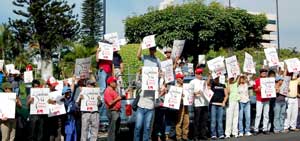El Salvador struggle over water brings gov't repression
By
Heather Cottin
Published Jul 26, 2007 9:50 PM
José Ever Fuentes is a leader of campesinos from Oratorio de la Concepción, a
peasant community near Suchitoto, El Salvador. When, early in July, local
organizers in Suchitoto called for a march against the privatization of water
in the region, Fuentes joined hundreds of campesinos and workers from the area
in the protest.
|
Protest in San Salvador after arrests
in Suchitoto.
Photo: FMLN
|
Fuentes is a long-time member of the Faribundo Martí National Liberation
Front (FMLN), now a legal party in El Salvador, which has resisted
U.S.-sponsored dictators and imperialism since leading a war of liberation in
the 1980s.
Workers World interviewed his son, René Valentino, at an FMLN-NY activity
on Long Island. Valentino said the marchers faced the combined forces of the
army and police, equipped with artillery, machine guns and helicopters, as well
as units of the anti-riot squad. El Salvador’s ARENA government attacked
the peaceful demonstration, wounding over 100 people. Dozens were hospitalized.
Under a new “anti-terrorism” law, 14 protesters were arrested,
including his father.
Many of the arrested were women. They are being denied water and medical
assistance, according to the Committee of Families for Freedom of Political
Prisoners in El Salvador.
Valentino noted that the government announced its National Policy of Water
Decentralization on July 2, exactly one year after the torture and murder of
the parents of Monjarás Manzanares, known as “Mariposa,” who
was from Suchitoto. “Mariposa” had been the voice of the
FMLN’s Radio Venceremos during the war.
The region around Suchitoto is an FMLN stronghold. Thousands were killed there
by the army during the war, Valentino said. After the arrests and the attack on
the Suchitoto protesters, FMLN organizations across the country demanded the
release of the prisoners and 20,000 people marched in San Salvador on July
7.
Water, profits and repression
Some 90 percent of El Salvador’s natural water is contaminated. In 1999,
the country had the second-highest level of infant mortality in Central America
due to intestinal infections and diarrhea.
A government service, ANDA, provides water to 172 municipalities out of the 262
existing in the country, but cannot do so on a regular basis. ANDA reported
that in 2002 less than 53.3 percent of the population had access to piped
water.
In January 2000, the state water company tripled the price of water for those
who used the least, penalizing individual customers while offering a rebate for
businesses. Millions of El Salvadorans have to choose between drinking water
and their children’s education. Education is privatized, too.
Those who can afford $15 to $20 a month to buy drinking water from private
companies pay about six times the monthly ANDA bill. The ARENA government
exploits ANDA’s water delivery problems as a pretext to justify the entry
of private companies and has slashed its budget by 37 percent since 2005. (La
Prensa Gráfica, Dec. 27)
Representatives of SETA, the water workers’ union, say privatization
would mean the “extinction” of their union and limit
Salvadorans’ access to clean water. But Salvadoran President Antonio Saca
is pushing a privatization proposal, demanded under the “free
trade” CAFTA agreement, to comply with the requirements of a 1998 loan
from the Inter-American Development Bank. (Paul Pollack, ww4report.com, March
1, 2006)
This is known as “structural adjustment.”
Who must bear the weight of these adjustments? It is on the backs of poor
women. Women work overtime to buy water from tanker trucks. They stand in line
for hours at public standpipes. Women walk miles to collect water from streams
and ponds, carrying the burden on their heads.
El Salvador’s levels of income inequality rank among the highest in the
world, according to the United Nations Human Development Report on El Salvador
for 2003. In the 10 years before the report was issued, the wealthiest 20
percent of families “had increased their share of national income to 58.3
percent,” and the neediest 20 percent “had their share cut to 2.4
percent.”
Resisting privatization and repression
Since the Peace Accords brought a truce in 1992, the FMLN has been organizing
opposition to poverty, repression and privatization throughout the country.
In 1998, the government privatized ANTEL, the state-owned telephone company,
which led to the layoff of 5,000 workers, the loss of seniority, salary cuts
and the dissolution of ASTEL, the workers’ union. Phone rates soared, but
ASTEL reorganized with FMLN support three years later.
In 2002, the nurses and doctors of the Salvadoran Social Security Hospital
System, FMLN supporters, went on strike, successfully preventing the
privatization of health care.
El Salvadorans have a history of struggle.
The overwhelming opposition to the arrests and repression in Suchitoto prompted
Saca’s Cabinet of Public Security to present the Legislative Assembly
with a list of reforms of the Penal Code designed to increase the penalties
against what they called “public disorder.” The same day, July 23,
the FMLN immediately declared that the ARENA government was trying to create a
legal mechanism to strengthen repression.
Blanca Flor Bonilla, an FMLN leader in Nicaragua, denounced the government
measures: “The people are awakening. We are sure that we will beat
this.” She was referring to the masses taking to the streets and to
anticipated FMLN victories in municipal, legislative and presidential elections
coming up in 2009. (Prensa Latina)
“These protests will free our political prisoners. ... Suchitoto shows
that the next victory for the people of Latin America will be in El
Salvador,” René Valentino said.
Articles copyright 1995-2012 Workers World.
Verbatim copying and distribution of this entire article is permitted in any medium without royalty provided this notice is preserved.
Workers World, 55 W. 17 St., NY, NY 10011
Email:
[email protected]
Subscribe
[email protected]
Support independent news
DONATE


